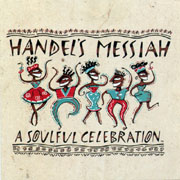
Handel’s Messiah—A Soulful Celebration
1992: Reprise 9 26980-2
duet: Vanessa Bell Armstrong & Daryl Coley
duet: Lizz Lee & Chris Willis
rap: Mike E.
lead vocal: Dianne Reeves
lead vocal: Patti Austin
lead vocal: Tramaine Hawkins
lead vocal: Howard Hewitt
lead vocal: Stevie Wonder & Take 6
background vocals: Take 6
lead vocals: Core Cotton, Jamecia Bennett, James Wright, Carrie Harrington, Pat Lacy
background vocals: Sounds of Blackness
vocals: The Boys Choir of Harlem, directed by Walter J Turnbull
rap: Leaders of the New School
lead vocal: Michelle Weeks
vocals: The Richard Smallwood Singers
performed by The Yellowjackets
vocalists: Commissioned & The Clark Sisters
lead vocal: Al Jarreau
lead vocals: Tevin Campbell
I’m an enthusiast by nature, and I take special note of songs which make me weep with joy every time I hear them; for that reason this album deserves particular focus, because it has many such songs. The great thing is that my endorsement of this is that of a very musical agnostic who is greatly skeptical about lyrical religious music in nearly any context. Put simply, this is an almost-too-slickly-produced vessel absolutely overflowing with pure worshipful joy.
From the start to the end of “Every Valley” I have a face-splitting mega-grin that feels like it’s going to explode into something even bigger to accomodate the delight I find in hearing such rejoicing so mightily strutted and so WELL. That’s saying something, considering that I loathe rap and yet can still get through its brief appearance in this track precisely because of its context (and the very fun sampling work happening in the background just then).
Other standout tracks are less solid from start to finish but generally spend their second halves delivering the goods despite the vagueness of their first halves: in other words, if you can get through the first half of the track, by tuning it out or leaving the room out if necessary, the second half is well worth playing at full volume. In this category: “And He Shall Purify,” “For Unto Us A Child Is Born,” “Rejoice Greatly, O Daughter of Zion,” and of course the H-Chorus itself, which has a pathetically spacey beginning and a delicious but unchanging sound when it arrives.
And actually “He Shall Purify” grows into such a great ending that I can delight in it even though the lyric of it (and of the original) is so bloody stupid—and circular logic, to boot. Ten years after I first called out this track, I still enjoy checking out new performances of it which turn up on YouTube (and there are some beauts, not least of which being the tight [if unexpectedly stiff, perhaps due to the denomination] ensemble Tremaine Hawkins herself guested for at an Adventist church and a surprisingly ringing English choir’s delivery by the Vocal Works Gospel Choir [in Bath]). I eventually became so intrigued by the musical-effect power of this track’s final sequence and its most *excellent* groove (again, despite the ultimate inanity of the lyrics) that I bought a copy of the sheet music so I could see just how that was pulled off in Michael O Jackson’s music and arrangement. Really knockout stuff at the end, there, impressive not least because it’s done as just an S-A-T array, although some of those YouTube-posted performances add a bass part which I as a quasi tenor who can’t quite reliably ride the part’s top A reluctantly covet. In any case, that ending makes clear why some people at particularly moving gospel-music church services stand up and sway along with the music—whether you believe in a god or not, there’s great evocative might in the cumulative and well-crafted sound itself.
Al Jarreau’s snazzy version of “Why Do The Nations So Furiously Rage?” is worth an extra mention—it’s wry and cool, it’s swift and snappy, and it’s just got a savvy smirk all over it.
As for the rest of the tracks, well, I don’t listen to smarmy “soul” radio because it all sounds like this studio-reverb pseudo-lush production work. The vocalists may be an array of big and less-big names, but the overall vocal mastery falls in that charming category of “enthusiastic”—well-meaning but not terribly skilled, or as Anna Russell described it “the singer with no voice but GREAT artistry.” This is what balances the parts of the album that make me weep with joy: the stuff that makes me scowl at the CD player and wonder how on earth such schlock could exist on the same album as that excellent stuff.
I’ll not deny that I also have trouble with this album on the basis of its self-professed racial distinction. Music’s music, to me, and celebrating something as “black music” is guaranteed to make me cringe. I have mixed feelings about that sort of thing, not least because it’s hardly conducive to a culture of indiscriminate appreciation, as it singles out one culture *racially* (whether for appreciation or denigration). I appreciate what was intended in doing so in this case, but it really is a debatable form of distinction.
Still, when the choirs let rip on this baby, there’s no volume setting high enough to tap the experience for its full glory. This is some mighty celebration.
Comments © 2005–2015 Mark Ellis Walker, except as noted, and no claim is made to the images and quoted lyrics.